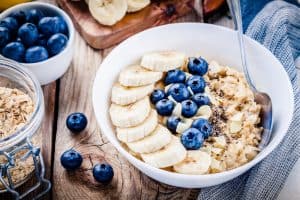Eating Breakfast May Increase Weight Loss
Breakfast is the most important meal of the day or is it? This is one of the most contested questions in the nutrition and weight loss world. Is breakfast really the most important meal of the day and does it help with weight loss? The problem is that the research often conflicts and experts fail to agree on whether breakfast is important for health and weight loss. Don’t always believe in hype and dogma. We all have a somewhat unique physiology and out bodies are unique so we should have different dietary requirements. To help answer this questions, we are going to review the available research.
A 2016 study from American Journal of Clinical Nutrition looked for a causal link between breakfast habits and components of energy balance in free-living obese humans[1]. The Bath Breakfast Project is a randomized controlled trial with repeated measures at baseline and follow-up among a cohort in South West England aged 21–60 y with dual-energy X-ray absorptiometry. In obese adults in the study, daily breakfast leads to greater physical activity during the morning, whereas morning fasting results in partial dietary compensation later in the day. There were no differences between groups in weight change and most health outcomes, but insulin sensitivity increased with breakfast relative to fasting. Unfortunately, body mass increased across both groups over time.
Another study published in 2017 in American Journal of Clinical Nutrition looked at meal skipping and the timing of meal skipping[2]. This approach is an interesting approach because meal skipping has become an increasing trend of the modern busy lifestyle. The study design is a randomized controlled crossover trial with 17 participants that underwent 3 isocaloric 24-h interventions (55%, 30%, and 15% carbohydrate, fat, and protein, respectively). The study looked at a breakfast skipping day and a dinner skipping day separated by a conventional 3-meal-structure day. Energy and macronutrient balance was measured in a respiration chamber and postprandial glucose, insulin, and inflammatory responses were analyzed. The researchers found that when compared with the 3-meal control, 24-h energy expenditure was higher on both skipping days, whereas fat oxidation increased on the breakfast skipping days only. Spontaneous physical activity, 24-h glycemia, and 24-h insulin secretion did not differ between intervention days. Compared with 3 meals/d, meal skipping increased energy expenditure.
Yet another 2017 study from the Journal of Behavioral Medicine examined the effects of breakfast eating and eating frequency on objectively assessed BMI and weight loss outcomes among adults enrolled in obesity treatment[3]. Participants completed measures of breakfast eating and eating frequency before and after treatment and had their height and weight measured. Baseline breakfast eating and eating frequency were not associated with baseline BMI and did not predict weight loss during treatment. From pre- to post-treatment, there was no significant change in eating frequency and changes in eating frequency had no impact on weight loss. However, increases in breakfast eating during treatment were associated with significantly better weight loss outcomes. These results suggest that increasing breakfast eating, while simultaneously reducing or keeping eating frequency constant, may improve outcomes in obesity treatment.
One final study from 2017 and published in Nutrients looked at the effect of skipping breakfast on health[4]. A secondary data analysis was conducted to examine associations between breakfast eating patterns and weight loss, nutrient intake, and metabolic parameters among participants with metabolic syndrome. Three randomly selected 24-h dietary recalls were collected from each participant at baseline and at the one-year visit. Skipped breakfast was seen in 32.9% at baseline and in 17.4% at the one-year visit, respectively. At baseline, after adjustment for demographics and physical activity, participants who ate breakfast had a higher thiamin, niacin, and folate intake than did breakfast skippers; other selected parameters including body weight, dietary quality scores, nutrient intake, and metabolic parameters showed no significant differences between the two groups. From baseline to one year, after adjustment for covariates, mean fat intake increased by 2.7% of total energy in breakfast skippers in comparison to the 1.2% decrease observed in breakfast eaters. This study did not support the hypothesis that skipping breakfast has an impact on body weight, nutrient intakes, and selected metabolic measures in participants with metabolic syndrome.
Other studies have found that breakfast helps with weight loss[5],[6],[7],[8],[9],[10],[11].
The bottom line: Despite this latest research shows, I still a breakfast supporter. In my medical practice, I still recommend breakfast to all of my patients. I personally have found that those who skip their morning meal tend to overeat during the rest of the day. I have found that breakfast skippers tend to have higher calorie intakes later in the day so I recommend against skipping meals. The above research proves that while breakfast eaters were more physically active in the morning that they tend to eat more. Because of the increased intake, subjects in multiple studies failed to experience significant weight loss. Over longer periods of time, these habit shifts could have a major impact on weight and body composition. If you find that you eat less and feel better if you eat breakfast, I suggest that you eat it. But, don’t let anyone convince you that your weight loss success will depend on consumption of any one meal.









Leave a Reply